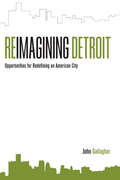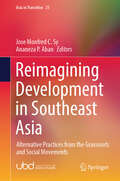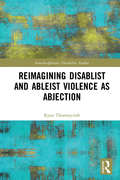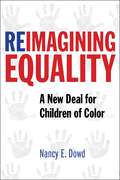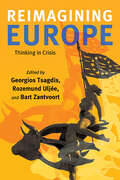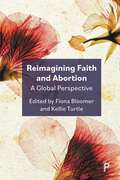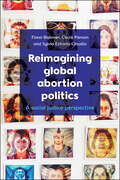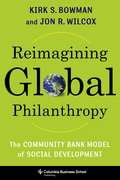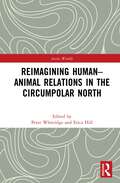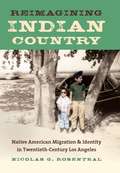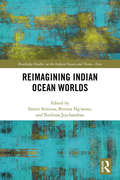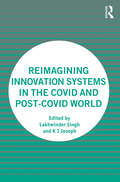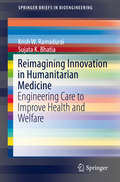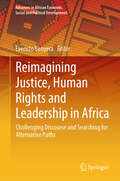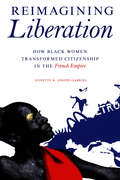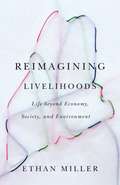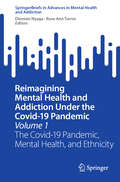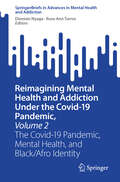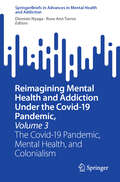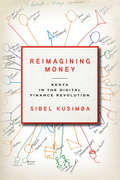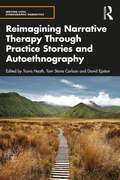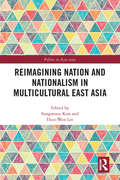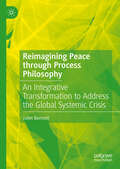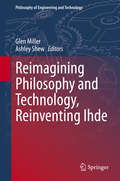- Table View
- List View
Reimagining Detroit: Opportunities for Redefining an American City
by John GallagherSuggests ways for Detroit to become a smaller but better city in the twenty first century and proposes productive uses for the city's vacant spaces.
Reimagining Development in Southeast Asia: Alternative Practices from the Grassroots and Social Movements (Asia in Transition #21)
by Jose Monfred C. Sy Ananeza P. AbanThis volume consolidates chapters from across Southeast Asia as a means of discussing alternative development pathways. It presents radical re-imaginings of how development might look, considered alongside the growing disillusionment over mainstream development models. In suggesting alternative models of development, it reframes participatory processes from the developing world, discussing practices of decolonization, anti-capitalism, plurality, anti-racism, effacing patriarchy, and ecological sustainability, designed and executed by grassroot communities and civil society organisations (CSOs). The grassroots and social movement paradigms highlighted in this collection seek to challenge and change the dominant model of development instituted in ASEAN, which have largely failed in meaningfully addressing the issues faced by different sectors. That the book project springs from an engagement between scholars and on-the-ground practitioners means that several chapters combine reflective, case-based viewpoints. To this end, the book is relevant to scholars, students, and practitioners working in areas related to Southeast Asian politics, economy, and culture.
Reimagining Disablist and Ableist Violence as Abjection (Interdisciplinary Disability Studies)
by Ryan ThorneycroftDrawing upon vivid and harrowing life history narratives of people labelled intellectually disabled, this book examines the ways in which disabled subjects are constituted, regulated, governed, and violated through an account of abjection. Extending interdisciplinary dialogues and approaches, it abandons a construct of violence (which by law requires a stable notion of a victim and a perpetrator) and moves to a theorisation of abjection to explore the ways in which disabled subjects are (re)produced, constituted, and treated through time. Deploying a wide range of interdisciplinary approaches, this book sits at the intersections of criminology and sociology, re-thinks notions of dis/ability, violence, and subjectivity, and utilises crip and queer theory to imagine dis/ability differently. It will be of interest to all scholars and students of disability studies, sociology and criminology, and specifically those working the areas of life history work, post-structuralism, hate crime, and post-modern criminology.
Reimagining Equality: A New Deal for Children of Color
by Nancy E. Dowd2018 Outstanding Academic Title, given by Choice MagazineA comprehensive examination of developmental inequality among children Developmental equality–whether every child has an equal opportunity to reach their fullest potential–is essential for children’s future growth and access to opportunity. In the United States, however, children of color are disproportionately affected by poverty, poor educational outcomes, and structural discrimination, limiting their potential. In Reimagining Equality, Nancy E. Dowd sets out to examine the roots of these inequalities by tracing the life course of black boys from birth to age 18 in an effort to create an affirmative system of rights and support for all children. Drawing on interdisciplinary research, the book demonstrates that black boys encounter challenges and barriers that funnel them toward failure rather than developmental success. Their example exposes a broader reality of hierarchies among children, linked to government policies, practices, structures, and institutions. Dowd argues for a new legal model of developmental equality, grounded in the real challenges that children face on the basis of race, gender, and class. Concluding with a “New Deal” for all children, Reimagining Equality provides a comprehensive set of policies that enables our political and legal systems to dismantle what harms and discriminates children, and maximize their development.
Reimagining Equality: Stories of Gender, Race, and Finding Home
by Anita HillDescended from slaves and born to black farmers, Anita Hill shares the stories of her own family's quest for home, from her great grandmother who was born into slavery to her own flight from the nest of small-town Oklahoma. As well as discussing art and media, such as Lorraine Hansberry's A Raisin in the Sun and the TV show The Jeffersons, Hill tells the stories of hairdressers, single mums, and her own siblings. She draws on literature, popular culture, and personal experience to argue that equality cannot be achieved merely by fighting for rights; it must be repositioned at the heart of the American Dream.
Reimagining Europe: Thinking in Crisis (SUNY series in Contemporary French Thought)
by Georgios Tsagdis; Rozemund Uljée; Bart ZantvoortReimagining Europe comprises a series of contributions which address, in various ways, the relationship between Europe and continental philosophy/phenomenology. Europe is in crisis: a crisis that no longer designates a moment of decision, a critical point between a before and an after, but a state, a permanent mode of being, a constant emergency. At this juncture of Europe, the aporia of language confronts the aporia of history. We cannot speak, we must speak, we shall speak. As such, the contributions all engage with the idea that the question "what is Europe?" must measure up a series of questions, namely: what was it to be? What does it mean to initiate and sustain a project, such as Europe, if only at times, after the fact? The questions of internal and external borders, of homogeneity and coherence, identity and equality, legitimacy and rights, democracy and representation can only be raised insofar as the question of Europe, its destiny, and destination, is raised as a whole.
Reimagining Faith and Abortion: A Global Perspective
by Fiona Bloomer and Kellie TurtleIn this book, faith leaders, scholars and activists from around the globe provide their perspective on faith and abortion. They reflect on examples of faith organisations which have provided leadership on the issue as well as examining religious approaches from Buddhist, Christian, Jewish, Muslim and interfaith perspectives. Challenging the assumption that all people of faith are anti-abortion, this book provides a counterpoint to right-wing faith perspectives and outlines how faith communities reimagine abortion as an issue of social, pastoral and theological concern. Providing perspectives from the global North and South, it includes settings where abortion is legal, and where it is restricted, and settings where abortion stigma is ever-present to settings where abortion is normalised. It also demonstrates the complex connections between faith and abortion, how women and pregnant people are positioned in society and how morality is claimed and challenged.
Reimagining Global Abortion Politics: A Social Justice Perspective
by Fiona Bloomer Claire PiersonWhat are the contemporary issues in abortion politics globally? What factors explain variations in access to abortion between and within different countries? This text provides a transnationally-focused, interdisciplinary analysis of trends in abortion politics using case studies from around the global north and south. It considers how societal influences, such as religion, nationalism and culture, impact abortion law and access. It explores the impact of international human rights norms, the increasing displacement of people due to conflict and crisis and the role of activists on law reform and access. The book concludes by considering the future of abortion politics through the more holistic lens of reproductive justice. Utilising a unique interdisciplinary approach, this book provides a major contribution to the knowledge base on abortion politics globally. It provides an accessible, informative and engaging text for academics, policy makers and readers interested in abortion politics.
Reimagining Global Philanthropy: The Community Bank Model of Social Development
by Kirk Bowman Jon WilcoxWell-meaning Westerners want to find ways to help the less fortunate. Today, many are not just volunteering abroad and donating to international nonprofits but also advancing innovations and launching projects that aim to be socially transformative. However, often these activities are not efficient ways of helping others, and too many projects cause more harm than good.Reimagining Global Philanthropy shares the journey of a conservative banker and a progressive professor to find a better way forward. Kirk S. Bowman and Jon R. Wilcox explain the boom in the global compassion industry, revealing the incentives that produce inefficient practices and poor outcomes. Instead of supporting start-up projects with long-shot hopes for success, they argue, we can dramatically improve results by empowering local leaders.Applying lessons from the success of community banks, Bowman and Wilcox develop and implement a new model that significantly raises philanthropic efficacy. Their straightforward and rigorously tested approach calls for community members to take the lead while outside partners play a supporting role. Bowman and Wilcox recount how they tested the model in Brazil, demonstrating the value of giving people in marginalized communities the opportunity to innovate. In a time of widespread social reckoning, this book shows how global philanthropy can confront its blind spots and failures in order to achieve truly transformative outcomes.Readers can access five of the documentary films discussed in the book on a companion website. In addition to the films, chapter discussion questions and other supplemental materials are also available at the site.
Reimagining Human-Animal Relations in the Circumpolar North (Arctic Worlds)
by Peter Whitridge Erica HillThis volume provides fresh insight into northern human–animal relations and illustrates the breadth and practical utility of archaeological human–animal studies. It surveys recent archaeological research in northern North America and Eurasia that frames human–animal relations as not merely economically exploitative but often socially complex and deeply meaningful, and attuned to the intelligence and agency of nonhuman prey and domesticates. The case studies sample a wide swath of the circumpolar region, from Alaska, Nunavut, and Greenland to northern Fennoscandia and western Siberia, and span sites, finds, and scenarios ranging in age from the Mesolithic to the twenty-first century. Many taxa on which northern lives hinged figure in these analyses, including large marine mammals, polar bear, reindeer, marine fish, and birds, and are variously approached from relational, multispecies, semiotic, osteobiographical, and political economic perspectives. Animals themselves are represented by osteological remains, harvesting gear, and depictions of animal bodies that include zoomorphic figurines, petroglyphs, ornamentation, and intricate portrayals of human–animal harvesting encounters. Far from settling the problem of how archaeologists should approach northern human–animal relations, these chapters reveal the irreducible complexity of northern worlds and highlight the diversity of human and nonhuman animal lives. This book will be of particular interest to northern archaeologists and zooarchaeologists, and all those interested in the possibilities of a multispecies approach to the archaeological record.
Reimagining Indian Country
by Nicolas G. RosenthalFor decades, most American Indians have lived in cities, not on reservations or in rural areas. Still, scholars, policymakers, and popular culture often regard Indians first as reservation peoples, living apart from non-Native Americans. In this book, Nicolas Rosenthal reorients our understanding of the experience of American Indians by tracing their migration to cities, exploring the formation of urban Indian communities, and delving into the shifting relationships between reservations and urban areas from the early twentieth century to the present. With a focus on Los Angeles, which by 1970 had more Native American inhabitants than any place outside the Navajo reservation, Reimagining Indian Country shows how cities have played a defining role in modern American Indian life and examines the evolution of Native American identity in recent decades. Rosenthal emphasizes the lived experiences of Native migrants in realms including education, labor, health, housing, and social and political activism to understand how they adapted to an urban environment, and to consider how they formed--and continue to form--new identities. Though still connected to the places where indigenous peoples have preserved their culture, Rosenthal argues that Indian identity must be understood as dynamic and fully enmeshed in modern global networks.
Reimagining Indian Ocean Worlds (Routledge Series on the Indian Ocean and Trans-Asia)
by Smriti Srinivas Bettina Ng'Weno Neelima JeychandranThis book breaks new ground by bringing together multidisciplinary approaches to examine contemporary Indian Ocean worlds. It reconfigures the Indian Ocean as a space for conceptual and theoretical relationality based on social science and humanities scholarship, thus moving away from an area-based and geographical approach to Indian Ocean studies. Contributors from a variety of disciplines focus on keywords such as relationality, space/place, quotidian practices, and new networks of memory and maps to offer original insights to reimagine the Indian Ocean. While the volume as a whole considers older histories, mobilities, and relationships between places in Indian Ocean worlds, it is centrally concerned with new connectivities and layered mappings forged in the lived experiences of individuals and communities today. The chapters are steeped in ethnographic, multi-modal, and other humanities methodologies that examine different sources besides historical archives and textual materials, including everyday life, cities, museums, performances, the built environment, media, personal narratives, food, medical practices, or scientific explorations. An important contribution to several fields, this book will be of interest to academics of Indian Ocean studies, Afro-Asian linkages, inter-Asian exchanges, Afro-Arab crossroads, Asian studies, African studies, Anthropology, History, Geography, and International Relations.
Reimagining Innovation Systems in the COVID and Post-COVID World
by Lakhwinder Singh and K J JosephCountries around the world are working to counter the devastating effects of the COVID-19 pandemic on their healthcare systems, economies, and industries. This book brings together strategies for the adoption of new technologies and innovation systems which would help re-invigorate social and economic institutions and help communities, especially in the Global South. The book focuses on innovation systems that address health and socioeconomic inequalities in countries such as India, Africa, Brazil, Costa Rica, and others. It looks into the responses of different countries to the shocks inflicted on the economy and health systems by the pandemic from the perspective of government institutions as well as businesses, industries, and communities. The pandemic forced many organizations to embrace various innovative strategies to contain the spread of COVID-19 and ameliorate the lives of people including employees, people from marginalized communities, and low-income groups who have suffered due to the disease. The chapters in this book study innovative interventions and community-based measures which reached many people and paved the way for policies which helped rebuild communities sustainably. The volume also analyses how these newly created and streamlined health and economic innovation systems will be carried forward in the post-COVID-19 world to address weaknesses in health and governance and address inequalities, especially for countries in the Global South. This book will be of interest to scholars and students of economics, political economy, health and economics, development studies, public policy, and sociology.
Reimagining Innovation in Humanitarian Medicine: Engineering Care to Improve Health and Welfare (SpringerBriefs in Bioengineering)
by Sujata K. Bhatia Krish W. RamaduraiThroughout history, humanity has been plagued by a myriad of humanitarian crises that seemingly take the form of perpetual human suffering. Today, approximately 125,000,000 people require humanitarian assistance as the result of famine, war, geopolitical conflict, and natural disasters. A core component of this suffering is afflictions related to human health, where disturbances strain or overwhelm the existing healthcare infrastructure to create the conditions for an increase in morbidities and co-morbidities. One of the more startling elements is the loss of life to preventable medical conditions that were not properly treated or even diagnosed in the field, and is often due to the limited interventional capacity that medical teams and humanitarian practitioners have in these scenarios. These individuals are often hindered by medical equipment deficiencies or devices not meant to function in austere conditions. The development of highly versatile, feasible, and cost-effective medical devices and technologies that can be deployed in the field is essential to enhancing medical care in unconventional settings. In this book we examine the nature of the creative problem-solving paradigm, and dissect the intersection of frugal, disruptive, open, and reverse innovation processes in advancing humanitarian medicine. Specifically, we examine the feasible deployment of these devices and technologies in unconventional environments not only by humanitarian aid and disaster relief agencies, but also by crisis-affected communities themselves. The challenge is complex, but the financial support and technical development of innovative solutions for the delivery of humanitarian aid is a process in which everyone is a stakeholder.
Reimagining Justice, Human Rights and Leadership in Africa: Challenging Discourse and Searching for Alternative Paths (Advances in African Economic, Social and Political Development)
by Everisto BenyeraFailed attempts in Africa to develop, democratise and instil virtues of a just state and society which promote benevolent leadership and advance political and economic rights and freedoms call for a ‘new’ imagination. By exploring a wide range of issues concerning justice, human rights and leadership, this book makes two major contributions to the extant literature in each of these areas. Firstly, as a project in decoloniality, it constitutes an ‘epistemic break’ from mainstream logics and approaches to understanding state, society and development in Africa, presenting an approach that is filtered through a Euro-American lens that reifies the hegemony of a particular spatio-temporality. In other words, it emphasises the importance of situatedness by thinking from rather than about or with Africa. And secondly, it addresses a fundamental shortcoming in decolonial thought, which is often criticised for rejecting western paradigms of thought without providing viable alternatives. The issues covered include state failure in Africa, the geopolitics of US and NATO military interventions on the continent, individual states’ responses to international law, indigenous moral political leadership, authentic inclusion of marginalised voices in development practice, an endogenous approach to environmental ethics, and a spiritualist reflection on the need for Africa to chart her own course to political, social and economic redemption. By searching for alternative paths to justice, human rights and leadership, this book represents an effort to actualise the core vision of the African Renaissance to find ‘African solutions for African problems’.
Reimagining Liberation: How Black Women Transformed Citizenship in the French Empire (New Black Studies Series)
by Annette K. Joseph-GabrielBlack women living in the French empire played a key role in the decolonial movements of the mid-twentieth century. Thinkers and activists, these women lived lives of commitment and risk that landed them in war zones and concentration camps and saw them declared enemies of the state. Annette K. Joseph-Gabriel mines published writings and untapped archives to reveal the anticolonialist endeavors of seven women. Though often overlooked today, Suzanne Césaire, Paulette Nardal, Eugénie Éboué-Tell, Jane Vialle, Andrée Blouin, Aoua Kéita, and Eslanda Robeson took part in a forceful transnational movement. Their activism and thought challenged France's imperial system by shaping forms of citizenship that encouraged multiple cultural and racial identities. Expanding the possibilities of belonging beyond national and even Francophone borders, these women imagined new pan-African and pan-Caribbean identities informed by black feminist intellectual frameworks and practices. The visions they articulated also shifted the idea of citizenship itself, replacing a single form of collective identity and political participation with an expansive plurality of forms of belonging.
Reimagining Livelihoods: Life beyond Economy, Society, and Environment (Diverse Economies and Livable Worlds)
by Ethan MillerA provocative reassessment of the concepts underlying the struggle for sustainable developmentMuch of the debate over sustainable development revolves around how to balance the competing demands of economic development, social well-being, and environmental protection. &“Jobs vs. environment&” is only one of the many forms that such struggles take. But what if the very terms of this debate are part of the problem? Reimagining Livelihoods argues that the &“hegemonic trio&” of economy, society, and environment not only fails to describe the actual world around us but poses a tremendous obstacle to enacting a truly sustainable future.In a rich blend of ethnography and theory, Reimagining Livelihoods engages with questions of development in the state of Maine to trace the dangerous effects of contemporary stories that simplify and domesticate conflict. As in so many other places around the world, the trio of economy, society, and environment in Maine produces a particular space of &“common sense&” within which struggles over life and livelihood unfold. Yet the terms of engagement embodied by this trio are neither innocent nor inevitable. It is a contingent, historically produced configuration, born from the throes of capitalist industrialism and colonialism. Drawing in part on his own participation in the struggle over the Plum Creek Corporation&’s &“concept plan&” for a major resort development on the shores of Moosehead Lake in northern Maine, Ethan Miller articulates a rich framework for engaging with the ethical and political challenges of building ecological livelihoods among diverse human and nonhuman communities. In seeking a pathway for transformative thought that is both critical and affirmative, Reimagining Livelihoods provides new frames of reference for living together on an increasingly volatile Earth.
Reimagining Mental Health and Addiction Under the Covid-19 Pandemic, Volume 1: The Covid-19 Pandemic, Mental Health, and Ethnicity (Advances in Mental Health and Addiction)
by Dionisio Nyaga Rose Ann TorresThis edited collection is a follow-up to Algoma University's inaugural conference on mental health and addiction held at the Brampton campus in Ontario, Canada. We live in a society where many marginalized communities continue to bear a historically disproportionate burden on their psychological, mental, and economic well-being, especially under the Covid-19 pandemic. Covid-19 has had a continuing impact on marginalized and racialized communities at all levels. We are now witnessing the compounded effects in the form of a worsening mental health and addiction crisis and its subsequent impact on children's education, service delivery, and overall psychosocial well-being.Covid-19 has widened the gap and increased poverty disparities between high-income and low-income individuals. Furthermore, it has affected the psychosocial resilience of people. As communities of scholars, practitioners, and researchers, we have a responsibility to address these existential issues in ways that are ethical and transformative. This type of engagement should help mitigate the consequences of the pandemic in an intersectional manner. These conversations should assist us in understanding and addressing the trauma and suffering that marginalized communities and individuals continue to endure. Together, we can work to find answers to mental health and addiction challenges, while valuing people's histories and realities within this intersectional engagement.This book aims to redefine psychiatric discourse in the age of the pandemic and encourage us to imagine how the world can be reformed in ways that are both ethical and political. It has the potential to shed light on the values and realities of communities in discussions of medical sociology, particularly concerning the impact of Covid-19 on marginalized communities.This book is structured into three volumes. Volume one delves into the repercussions of the COVID-19 pandemic on the mental health of various ethnic groups. Volume two specifically addresses the impact of the pandemic on the mental health of Afro-Black individuals. Volume three explores the connections between the COVID-19 pandemic, psychological well-being, and colonialism.
Reimagining Mental Health and Addiction Under the Covid-19 Pandemic, Volume 2: The Covid-19 Pandemic, Mental Health, and Black/Afro Identity (Advances in Mental Health and Addiction)
by Dionisio Nyaga Rose Ann TorresThis edited collection is a follow-up to Algoma University's inaugural conference on mental health and addiction held at the Brampton campus in Ontario, Canada. We live in a society where many marginalized communities continue to bear a historically disproportionate burden on their psychological, mental, and economic well-being, especially under the Covid-19 pandemic. Covid-19 has had a continuing impact on marginalized and racialized communities at all levels. We are now witnessing the compounded effects in the form of a worsening mental health and addiction crisis and its subsequent impact on children's education, service delivery, and overall psychosocial well-being. Covid-19 has widened the gap and increased poverty disparities between high-income and low-income individuals. Furthermore, it has affected the psychosocial resilience of people. As communities of scholars, practitioners, and researchers, we have a responsibility to address these existential issues in ways that are ethical and transformative. This type of engagement should help mitigate the consequences of the pandemic in an intersectional manner. These conversations should assist us in understanding and addressing the trauma and suffering that marginalized communities and individuals continue to endure. Together, we can work to find answers to mental health and addiction challenges, while valuing people's histories and realities within this intersectional engagement. This book aims to redefine psychiatric discourse in the age of the pandemic and encourage us to imagine how the world can be reformed in ways that are both ethical and political. It has the potential to shed light on the values and realities of communities in discussions of medical sociology, particularly concerning the impact of Covid-19 on marginalized communities. This book is structured into three volumes. Volume one delves into the repercussions of the COVID-19 pandemic on the mental health of various ethnic groups. Volume two specifically addresses the impact of the pandemic on the mental health of Afro-Black individuals. Volume three explores the connections between the COVID-19 pandemic, psychological well-being, and colonialism.
Reimagining Mental Health and Addiction Under the Covid-19 Pandemic, Volume 3: The Covid-19 Pandemic, Mental Health, and Colonialism (Advances in Mental Health and Addiction)
by Dionisio Nyaga Rose Ann TorresThis edited collection is a follow-up to Algoma University's inaugural conference on mental health and addiction held at the Brampton campus in Ontario, Canada. We live in a society where many marginalized communities continue to bear a historically disproportionate burden on their psychological, mental, and economic well-being, especially under the Covid-19 pandemic. Covid-19 has had a continuing impact on marginalized and racialized communities at all levels. We are now witnessing the compounded effects in the form of a worsening mental health and addiction crisis and its subsequent impact on children's education, service delivery, and overall psychosocial well-being.Covid-19 has widened the gap and increased poverty disparities between high-income and low-income individuals. Furthermore, it has affected the psychosocial resilience of people. As communities of scholars, practitioners, and researchers, we have a responsibility to address these existential issues in ways that are ethical and transformative. This type of engagement should help mitigate the consequences of the pandemic in an intersectional manner. These conversations should assist us in understanding and addressing the trauma and suffering that marginalized communities and individuals continue to endure. Together, we can work to find answers to mental health and addiction challenges, while valuing people's histories and realities within this intersectional engagement.This book aims to redefine psychiatric discourse in the age of the pandemic and encourage us to imagine how the world can be reformed in ways that are both ethical and political. It has the potential to shed light on the values and realities of communities in discussions of medical sociology, particularly concerning the impact of Covid-19 on marginalized communities.This book is structured into three volumes. Volume one delves into the repercussions of the COVID-19 pandemic on the mental health of various ethnic groups. Volume two specifically addresses the impact of the pandemic on the mental health of Afro-Black individuals. Volume three explores the connections between the COVID-19 pandemic, psychological well-being, and colonialism.
Reimagining Money: Kenya in the Digital Finance Revolution (Culture and Economic Life)
by Sibel KusimbaTechnology is rapidly changing the way we think about money. Digital payment has been slow to take off in the United States but is displacing cash in countries as diverse as China, Kenya, and Sweden. In Reimagining Money, Sibel Kusimba describes the rise of M-Pesa, and offers a rich portrait of how this technology changes the economic and social landscape, allowing users to create webs of relationships as they exchange, pool, borrow, lend, and share digital money in user-built networks. These networks, Kusimba argues, will shape the future of financial technologies and their impact on poverty, inclusion, and empowerment. She describes how urban and transnational migrants maintain a presence in rural areas through money gifts; how families use crowdfunding software to assemble donations for emergency medical care; and how new financial groups invest in real estate and fund weddings. The author presents fascinating accounts that challenge accepted wisdom by examining the notion of money as wealth-in-people—an idea long-cultivated in sub-Saharan Africa and now brought to bear on the digital age with homegrown financial technologies such as digital money transfer, digital microloans, and crowdfunding. The book concludes by proposing a new theory of money that can be applied to designing better financial technologies in the future.
Reimagining Narrative Therapy Through Practice Stories and Autoethnography (Writing Lives: Ethnographic and Autoethnographic Narratives)
by Travis HeathReimagining Narrative Therapy Through Practice Stories and Autoethnography takes a new pedagogical approach to teaching and learning in contemporary narrative therapy, based in autoethnography and storytelling. The individual client stories aim to paint each therapeutic meeting in such detail that the reader will come to feel as though they actually know the two or more people in the room. This approach moves beyond the standard narrative practice of teaching by transcripts and steps into teaching narrative therapy through autoethnography. The intention of these 'teaching tales' is to offer the reader an opportunity to enter into the very 'heart and soul' of narrative therapy practice, much like reading a novel has you enter into the lives of the characters that inhabit it. This work has been used by the authors in MA and PhD level classrooms, workshops, week-long intensive courses, and conferences around the world, where it has received commendations from both newcomer and veteran narrative therapists. The aim of this book is to introduce narrative therapy and the value of integrating autoethnographic methods to students and new clinicians. It can also serve as a useful tool for advanced teachers of narrative practices. In addition, it will appeal to established clinicians who are curious about narrative therapy (who may be looking to add it to their practice), as well as students and scholars of autoethnography and qualitative inquiry and methods.
Reimagining Nation and Nationalism in Multicultural East Asia (Politics in Asia)
by Sungmoon Kim Hsin-Wen LeeSince the late 1980s, many East Asian countries have become more multicultural, a process marked by increased democracy and pluralism despite the continuing influence of nationalism, which has forced these countries in the region to re-envision their nations. Many such countries have had to reconsider their constitutional make-up, their terms of citizenship and the ideal of social harmony. This has resulted in new immigration and border-control policies and the revisiting of laws regarding labor policies, sociopolitical discrimination, and socioeconomic welfare. This book explores new perspectives, concepts, and theories that are socially relevant, culturally suitable, and normatively attractive in the East Asia context. It not only outlines the particular experiences of nation, citizenship, and nationalism in East Asian countries but also places them within the wider theoretical context. The contributors look at how nationalism under the force of multiculturalism, or vice versa, affects East Asian societies including China, Japan, Korea, Taiwan, and Hong Kong differently. The key themes are: Democracy and equality; Confucianism’s relationship with nationalism, cosmopolitanism and multiculturalism; China’s use of its political institutions to initiate and sustain nationalism; the impact of globalization on nationalism in South Korea, Taiwan and Japan; the role of democracy in reinvigorating indigenous cultures in Taiwan.
Reimagining Peace through Process Philosophy: An Integrative Transformation to Address the Global Systemic Crisis
by Juliet BennettThis book explores the ways in which process philosophers extend and strengthen peace scholars’ outlines of a paradigm of/for peace. It then illustrates the value of such a peace paradigm through the example of the climate breakdown, showing how process thinking and process metaphysics intervene at the roots of a global systemic crisis. In doing so, it articulates a new inroad to process philosophy, and illuminates an integrative intervention in the systemic crises of climate change and global inequality. The “static-process framework” developed in this book makes the philosophy of Alfred North Whitehead and the fields he has inspired easier to grasp, and offers a tool to assist in the application of process thought to a multitude of issues. This framework depicts tensions between two modes of thought—static and process thinking—according to five “basic orientations”: abstract/context, closed/open, isolating/relational; passive/generative; one/multi-dimensional. This pattern is mapped across the domains of metaphysics, economics, politics and as the basis for a new mode of living and organising across multiple layers of society.
Reimagining Philosophy and Technology, Reinventing Ihde (Philosophy of Engineering and Technology #33)
by Ashley Shew Glen MillerThis volume includes eleven original essays that explore and expand on the work of Don Ihde, bookended by two chapters by Ihde himself. Ihde, the recipient of the first Society for Philosophy and Technology's Lifetime Achievement Award in 2017, is best known for his development of postphenomenology, a blend of pragmatism and phenomenology that incorporates insights into the ways technology mediates human perception and action.The book contains contributions from academics from Europe, North America, and Asia, which demonstrates the global impact of Ihde’s work. Essays in the book explore the relationship between Ihde's work and its origins in phenomenology (especially Husserl and Heidegger) and American pragmatism; integrate his philosophical work within the embodied experience of radical architecture and imagine the possibility of a future philosophy of technology after postphenomenology;develop central ideas of postphenomenology and expand the resources present in postphenomenology to ethics and politics; andextend the influence of Ihde's ideas to mobile media and engineering, and comprehensively assess the influence of his work in China. The book includes a reprint of the Introduction of Sense and Significance, one of Ihde's first books; "Hawk: Predatory Vision," a new chapter that blends his biographical experience with feminism, technoscience, and environmental observation; and an appendix that lists all of Ihde's books as well as secondary sources annotated by Ihde himself. Starting with an Editors' Introduction that offers an overview of the central ideas in Ihde's corpus and concluding with an index that facilitates research across the various chapters, this book is of interest to a diverse academic community that includes philosophers, STM scholars, anthropologists, historians, and sociologists.
